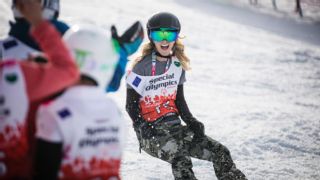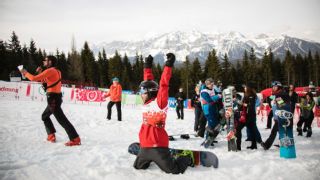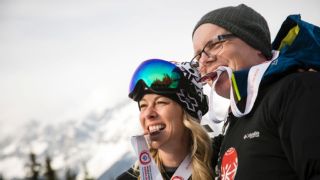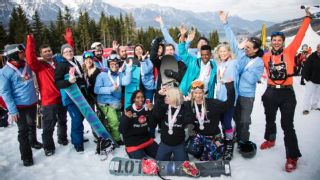|
"Let me win. But if I cannot win, let me be brave in the attempt." As I stood in the start gate at the top of the giant slalom course on Tuesday, I repeated those words to myself. In the past few hours, they had taken on new meaning. First spoken by Special Olympics founder Eunice Kennedy Shriver at the inaugural international Games in Chicago in 1968, the Special Olympics oath has since been uttered by every athlete who's participated in a Special Olympics sport. On Tuesday afternoon, I took that oath before competing in the Unified Snowboarding race, which pairs people with and without intellectual disabilities on the same team. When I arrived at the athlete tent for pairing, I was introduced to my teammate, Andre Berg, a Special Olympics athlete from Norway who earlier in the week won a gold medal in the Super-G. He has competed in the past two Unified Snowboarding races at X Games Aspen with two-time X Games gold medalist Silje Norendal. He's been snowboarding since he was 3 and racing for more than a decade. He speaks four languages fluently.  "It's such a pleasure to be your teammate," I said. "I'm so excited. This is my first race. Ever." I waited for the disappointment in Andre's eyes, waited to hear, in any one of those four languages, "Really, you paired me with a rookie?" Instead, he engulfed me in a massive bear hug and told me to take a breath. "Just relax," he said. "You'll be great. We are going to have fun." Besides, he reminded me, "I already have a gold medal." Pressure off. Remember the oath. The first time I heard those 15 words, which Shriver wrote on the morning of those first Games in Chicago, I found them to be profoundly relevant for any sporting event, not just the Special Olympics. Every athlete wants to win. So it takes bravery to stand in front of the world and compete -- to perform your best knowing it might be good enough for a medal, but then again, it might not. It takes guts to be OK with that. For most of the morning, I thought I was. But as I stood in the start area joking around with Andre and the rest of the athletes and their Unified partners, the nerves hit me. Unified events are not about medals. In fact, every team receives the same medal, whatever place they finish. "Unified is about bringing together people with and without intellectual disabilities, learning from each other's peculiarities and skills, breaking down prejudices and judgments, and seeing people for who they are," said Special Olympics Chairman Tim Shriver, who competed in the race, as did his wife, Linda. Tim is Eunice Kennedy Shriver's son.  But what if I let my teammate down? What if his best was good enough for a medal, but mine wasn't? Right then, I caught a case of the "should haves." I should have waxed my board. I should have tuned my board. I should have taken some practice runs. I should have had one more cup of coffee! Most of the above, I think I said out loud. That's when just about everyone in the start area caught on to my rookie freak-out and started offering me advice. "Remember to bend your knees, stay low and hug the gates," said U.S. athlete Daina Shilts, a two-time World Games competitor who, shortly before our race, had won her second gold medal of these Games. She's also a three-time medalist at the X Games Unified race in Aspen. "Watch that bump at the top of the course," said Daina's teammate, Olympic gold medalist Hannah Teter. "It's tripping up everyone. And keep your legs soft." "Just relax and have fun," Andre said. "I told you that earlier." It was clearly my final warning.  Before I realized it, the first competitors were dropping in for their runs. Each time an athlete readied in the start, we gathered around to hoot and holler and cheer them through the first four gates. Then they disappeared behind some trees and headed to the bottom of the course, where the rest of the competitors waited with high fives and hugs. When it was time for me to strap into my board and stand in the start, I wanted time to slow down. I thought about the first time I went skydiving and the first time I jumped from a platform to take my rookie swings on a trapeze. Both times, in the moment before jumping, I thought to myself, "You can never do this again for the first time. Stop. Breathe. Look around. Remember this moment." I had those same thoughts in the start gate Tuesday. Then I finally took Andre's advice, took that breath and calmed down. I looked around -- at the Dachstein Mountains, at the first blooms of spring, at everyone cheering around me -- and it was all I could do to hold back the emotion of the moment. (I'm having the same difficulty as I write this sentence.) I felt so privileged to have a spot in the race and to be Andre's teammate, and I realized the only way I could let him down was by not trying. "Be brave in the attempt," I thought, and I dropped in for my first run as a competitive snowboarder.  It was one of the most fun runs I've ever taken on a snowboard. My knees were bent, my legs were soft, I did my best to hug the gates, and I absolutely had fun. I'm pretty sure you can still hear my giggles echoing through the Alps. At the bottom of the course, Andre's was the first face I saw. His hand was already lifted and ready for a fist bump. I didn't look at the scoreboard, didn't ask where we finished. I hugged my teammate and thanked him for the day. "Did you have fun?" I asked him. "I did," he said. "Did you relax?" he asked me. "I did," I said. Then we agreed: we, in fact, had won.
|
